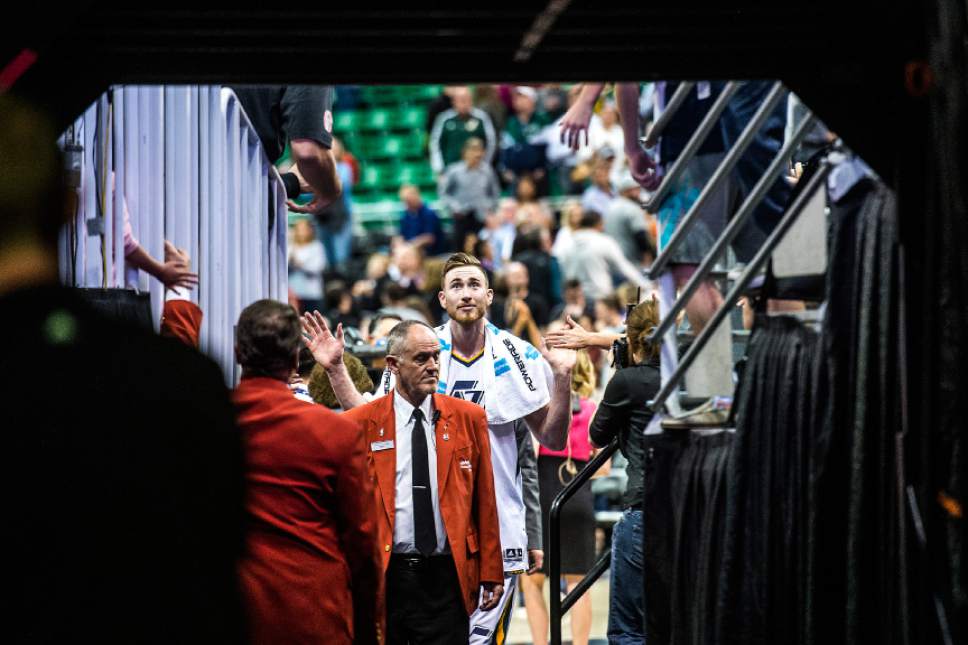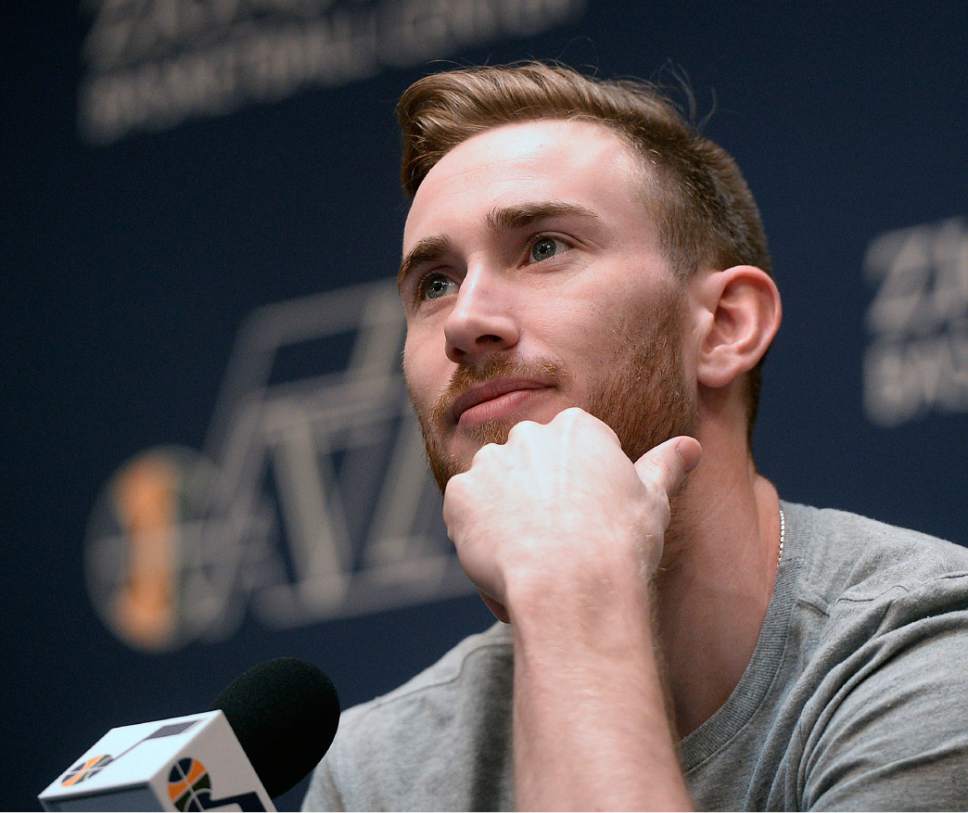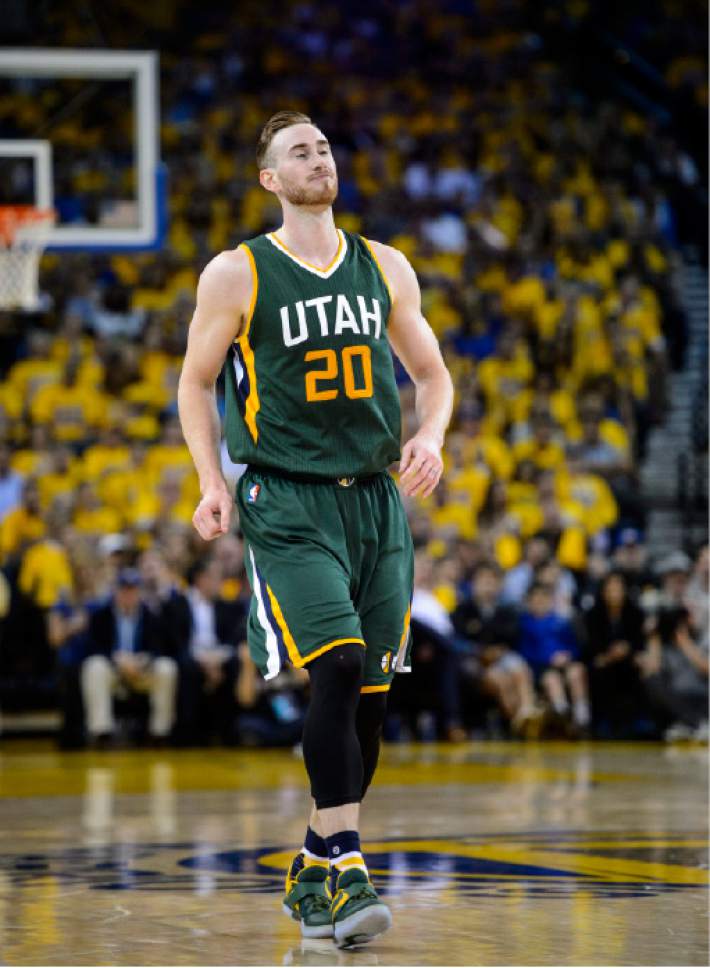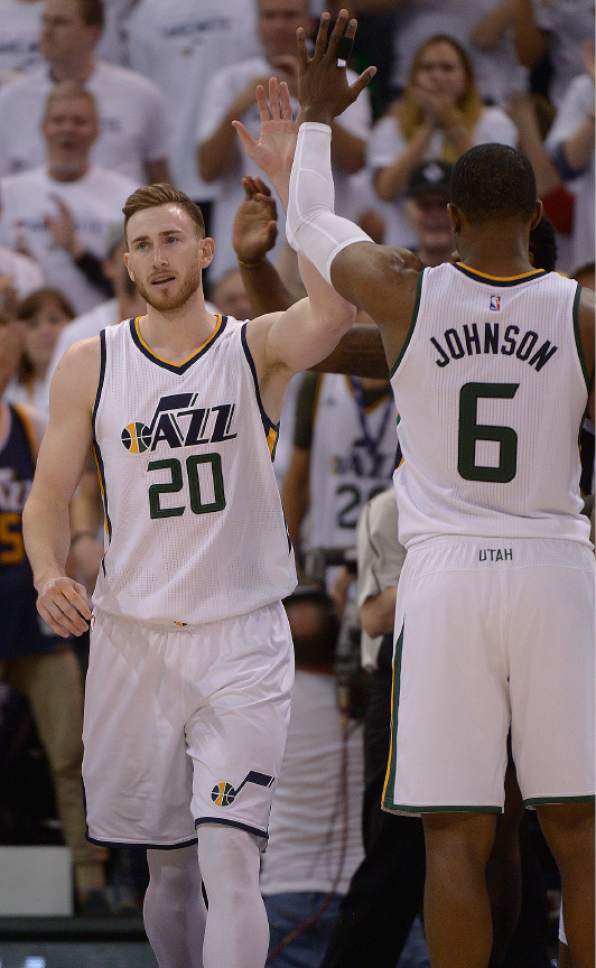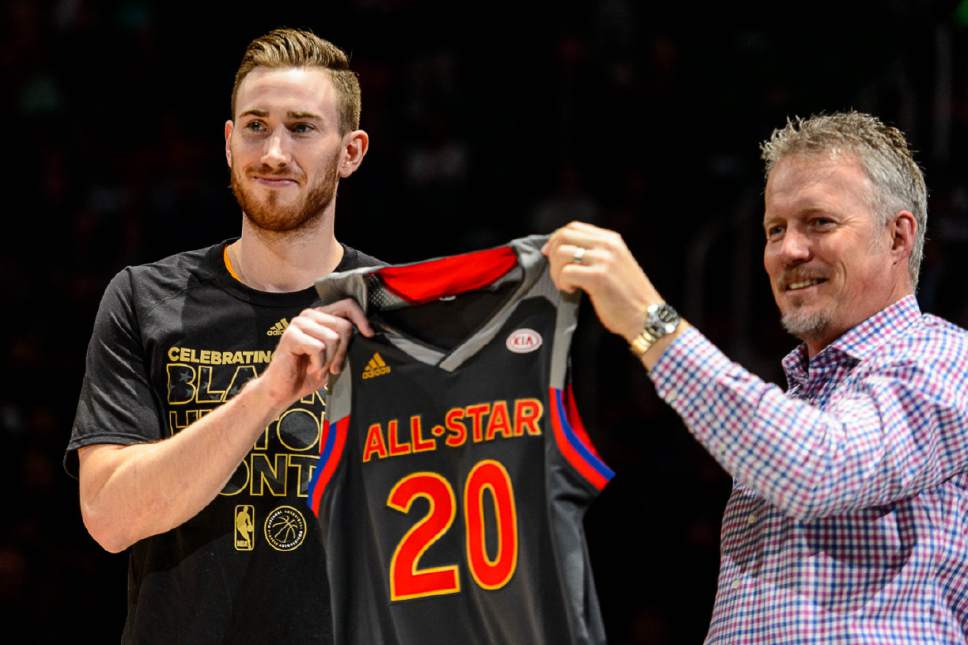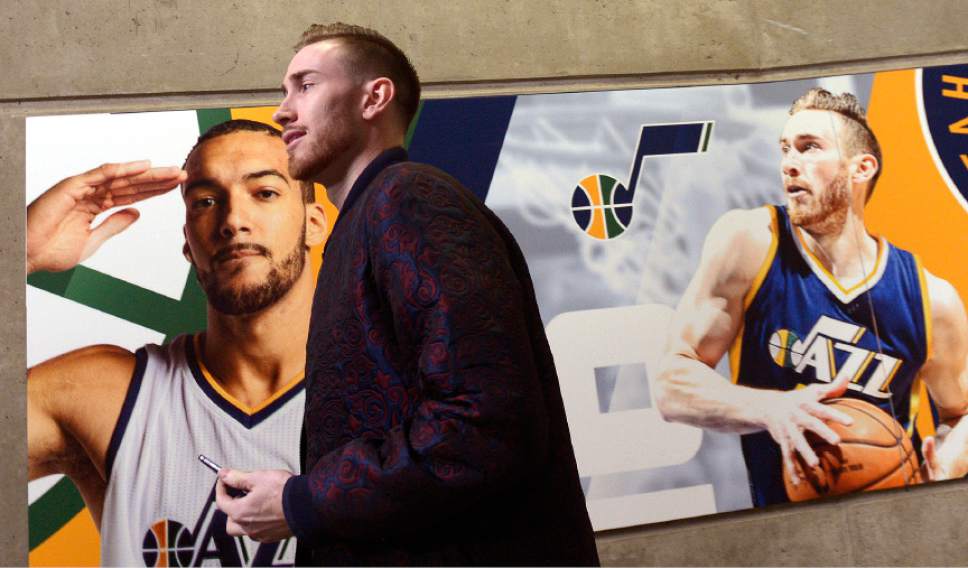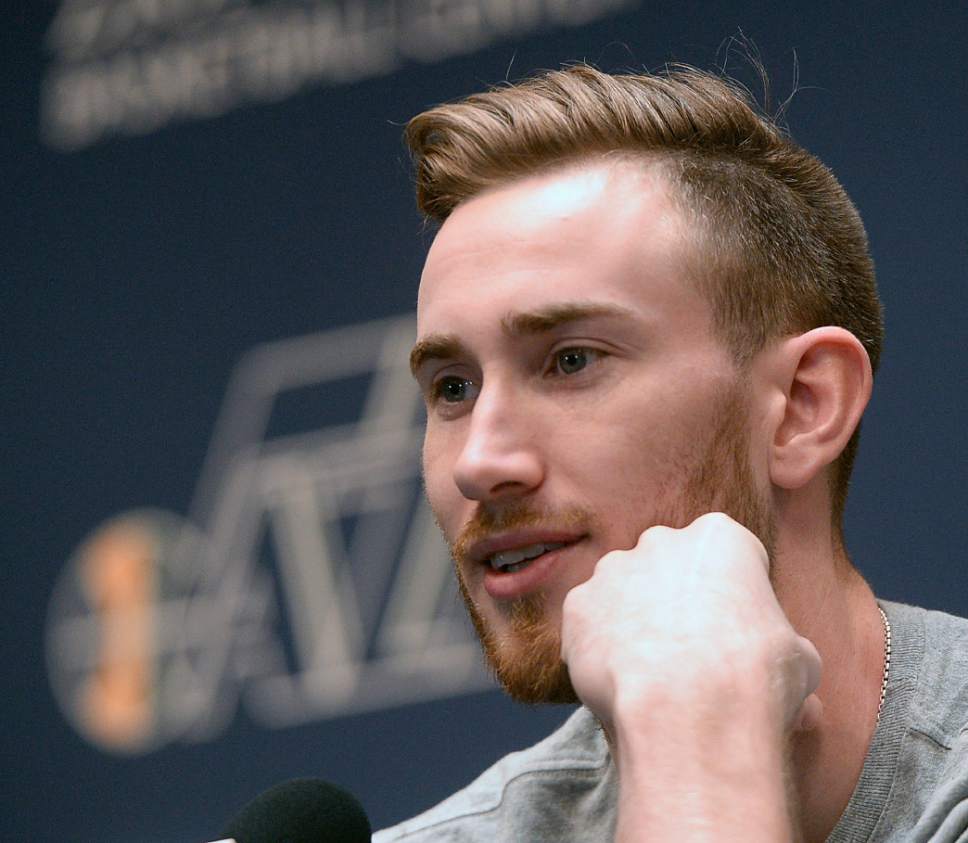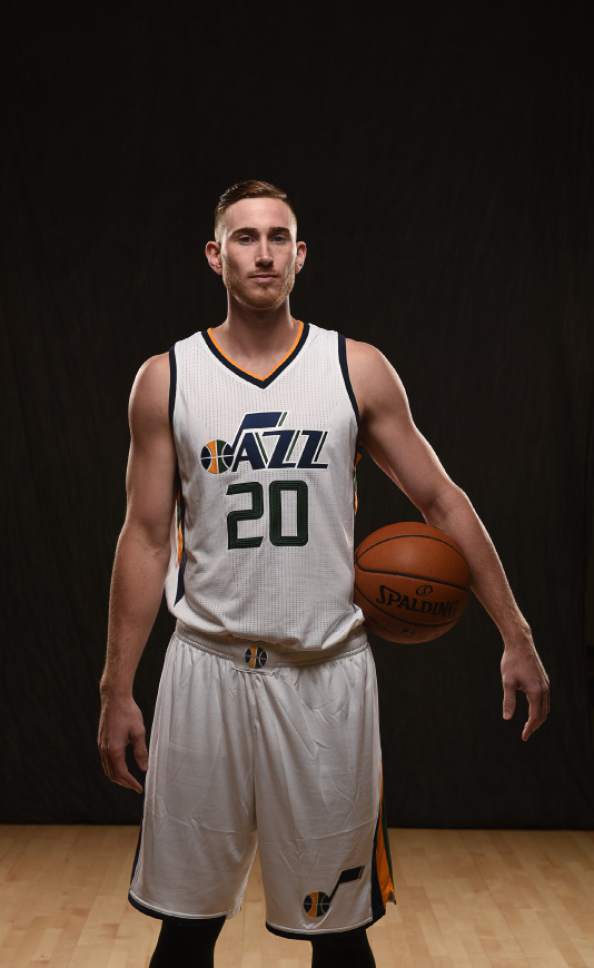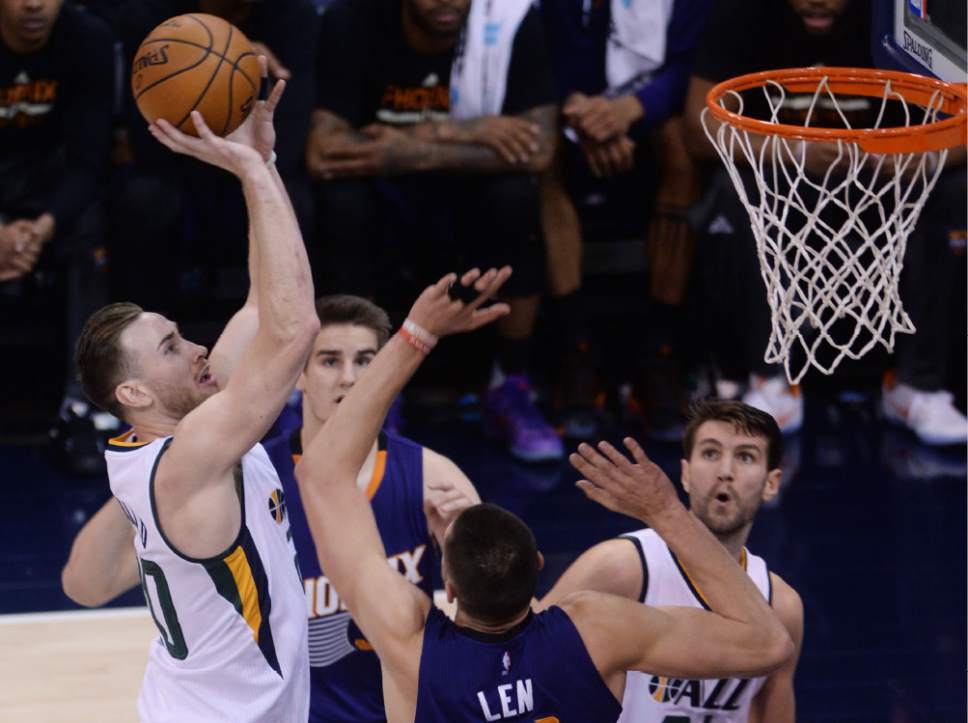This is an archived article that was published on sltrib.com in 2017, and information in the article may be outdated. It is provided only for personal research purposes and may not be reprinted.
Dennis Lindsey boarded a plane on the Fourth of July, the future of the franchise hanging in the balance. For five years, the Utah Jazz general manger painstakingly had built a roster he believed could contend with the best in the NBA.
Now he desperately needed the biggest piece to fall into place. But by the time his plane had landed, he had received the disappointing news.
Gordon Hayward was gone.
"This is the first time I've had a significant player leave a program that I was involved with," Lindsey said a few days later. "If you're in the business long enough, you know that this is possible. With free agency, trades, draft negotiations, dealing with the media, we always do autopsies and see what we can do to do better."
When LeBron James first left the Cleveland Cavaliers for the Miami Heat, it was called The Decision. On Tuesday, there was The Indecision, a saga in which Jazz fans — and people inside the organization — were taken on an emotional roller coaster.
People inside the Jazz organization were confident they would be able to keep their homegrown All-Star, but there were signs that it would not be easy. The Salt Lake Tribune has learned that before the NBA draft, Hayward talked with George Hill, whom he had grown close to this past season after Hill was acquired from the Indiana Pacers and enjoyed a successful — if injury-plagued — season in Utah. Hayward made it clear to Hill during that phone conversation that his returning to Utah was nowhere close to guaranteed, say sources who asked not to be identified because of their relationship with Hayward and Hill.
Friday: Hayward approves as Jazz acquire Rubio
Hayward's impending free agency had been a huge storyline for the past year. Every smile, or frown, was dissected. Each move was analyzed from the standpoint on how it helped or hurt the Jazz's ability to keep their All-Star forward.
By the time Hayward officially opted out of the final year of his contract with the Jazz on June 30, it was known that he would have meetings with three teams — at Miami on Friday, in Boston on Saturday and, finally, with members of the Jazz organization Monday in San Diego, where the Hayward family lives during the offseason.
While that was the public meeting schedule, sources — who asked not to be identified because of the sensitivity of the subject — told The Tribune that Hayward's agent, Mark Bartelstein, and the Jazz had talked throughout the week. And as Hayward was opting out of his contract, the Jazz made their first move of the offseason, trading a first-round draft pick to the Minnesota Timberwolves for point guard Ricky Rubio.
The Jazz considered Rubio an ideal fit for their lineup. Lindsey and Jazz coach Quin Snyder loved Rubio's defense and his leadership. And Utah was convinced that Rubio would help Hayward more offensively than any other point guard he had played with since he was drafted. Rubio's ability to see plays and passes would allow Hayward easier looks at the basket. Hayward's efficiency would improve, and his own playmaking load would lighten.
Sources said that while Hayward was not explicitly asked for his approval of the deal, the Jazz kept him looped in on the ongoing discussions. And when the Jazz informed the Hayward camp that the Rubio trade was close to being finished, sources told The Tribune that Hayward was excited about the trade, saying he "loved" Rubio's passing abilities and wanted the chance to play with him.
Lindsey pulled the trigger on the deal. With Rubio having two years remaining on his contract and at 26 years old, the Jazz envisioned him joining a core of Rudy Gobert, Rodney Hood and Hayward that would be entering the primes of their careers together.
Saturday: Hitting South Beach, as Jazz keep building roster
Banners of Hayward in a Miami Heat jersey hung near the American Airlines Arena when Hayward met with Heat players in the lounge of the team's locker room Saturday, according to The Associated Press. They discussed how the franchise accommodates children (Hayward and his wife, Robyn, have two young daughters), extolled the South Florida tennis scene (a sport Hayward grew up playing) and talked about the Miami real estate market. Heat president Pat Riley and coach Erik Spoelstra later laid out their vision for building around the All-Star forward.
But even after that visit, Miami always was seen as an unlikely destination by most NBA observers. Miami clearly had the least talented roster of the three teams, and while the Jazz and Celtics easily qualified for the playoffs, the Heat were eliminated from playoff contention on the final night of the past season.
Then, as Hayward and his wife were in the midst of flying from Miami to Boston, a thunderbolt hit: The Jazz had re-signed restricted free agent Joe Ingles to a four-year, $52 million contract.
Ingles was an important signing in many ways for Utah. He had become a fan favorite in his two seasons and emerged as a crucial piece of the team in his second season. Whether as a starter at multiple positions or coming off the bench, Ingles provided a spark, basketball savvy and leadership.
Then there was the off-court impact. Not only do Ingles and Hayward share an agent in Bartelstein, they had forged a close bond over the past two seasons. One of the reasons Ingles finished the season as a starter was he and Hayward played so well together. They often connected on alley-oops with Hayward as the finisher. Ingles knew when and where to spot up for open 3-point looks when Hayward drove the lane. In the locker room, they often sat next to each other, comparing notes from the night and lobbing playful verbal darts at each other.
The Jazz, knowing his value, did not want Ingles to leave. While Ingles was receiving plenty of attention from other teams, the Jazz made it clear to Ingles and Bartelstein that they would match any offer sheet. Hayward's own free agency this summer happened because the Charlotte Hornets gave him an offer sheet featuring a player option after three years.
The Jazz knew this, and they also knew they didn't want to head into their Monday meeting with Hayward with any roster questions.
The Jazz had made two big moves to give Hayward seemingly everything he could ask for from a roster. Twitter buzzed about the contract and the connection Ingles and Hayward had. Gobert famously sent an emoji-filled Tweet that took a jab at Miami and Boston while praising the Jazz.
Utah's front office had made the moves it felt were necessary to secure Hayward's return. But still, there were nerves about the Celtics.
Sunday: Beantown blessing
Even last summer, it widely was known that Boston coveted Hayward. When the Jazz played at Boston during the past season, fans chanted his name. When Hayward's wife posted on Instagram in early June a photo of one of their daughters wearing a shirt with a shamrock on it with the words "Go Green," fans of both the Jazz and Celtics went into a frenzy. Robyn Hayward deleted the post and later clarified it, saying it was a St. Patrick's Day shirt that she got on sale.
On Sunday, the Celtics took Hayward and his wife to Fenway Park, where they showed him a highlight video on the stadium's Jumbotron and told Hayward how he might help add to Boston's legacy of athletic success. And, bluntly, there was this: Hayward repeatedly has said he wants to win a championship, and his path to the NBA Finals with Boston in the Eastern Conference would be markedly easier than with Utah in the Western Conference.
This past season, the West was regarded widely as the superior conference — and it only has gotten tougher in the offseason. Oklahoma City, which was the sixth seed with MVP Russell Westbrook, added Paul George from the Indiana Pacers, a onetime Boston target. Two other teams that did not make the West playoffs made big moves — Minnesota added Jimmy Butler from the Chicago Bulls and Denver added Paul Millsap from the Atlanta Hawks. Chris Paul switched teams but stayed in the Western Conference. And persistent rumors of LeBron James considering a second jump away from the Cleveland Cavaliers after this season made going to the Eastern Conference seemingly more desirable for Hayward.
All of those moves have weakened the Eastern Conference further — a point the Celtics emphasized in their meeting with Hayward, sources say. Boston general manager Danny Ainge also laid out a plan for building the team around Hayward in the future.
The Haywards were on a flight back to San Diego after meeting for nine hours. One more meeting awaited — with the team that developed him into an All-Star, and the only NBA franchise he ever had played for.
Monday: The Jazz sit down with their star
The Jazz contingent that arrived in San Diego on Monday consisted of team owners Gail and Greg Miller, president Steve Starks, Lindsey, Snyder and assistant coach Johnnie Bryant, who had been a frequent offseason visitor to the Hayward home.
The banter was friendly as Hayward gave the group a tour of the sprawling house. A sandwich spread was put out for lunch and the two sides dived into the Jazz's formal presentation, which lasted two hours, according to sources.
The essence of the pitch: stay with the Jazz and play with Gobert. The Jazz showed Hayward statistical evidence that not only was Gobert the best center in the league, but he also is a better player than anyone on the Celtics' roster. Stay with us, the Jazz pitched, and we'll build a potential 60-win team capable of contending for a championship, even in the loaded Western Conference.
The Jazz also appealed to Hayward's emotions. They talked about the growth the team and player had enjoyed together. And with a team that faces several salary cap decisions in the coming years, they made it clear the organization would be willing to bump past the NBA salary cap and pay the luxury tax — something the team hasn't done since 2011 — to keep their core group together long term. The Jazz, sources say, also offered Hayward not only a max contract, but also the ability to structure the contract any way he wanted.
After the formal presentation, the Jazz sprung a surprise on Hayward, when teammates Gobert, Ingles, Hood and newcomer Rubio — who had flown in from Spain for the occasion — walked through the door. They then ushered the All-Star into his backyard for another lengthy session to make their personal pitches to him. By all accounts, Hayward was happy to see his friends.
The Millers were engaged and resolute throughout the meeting, according to sources. When it ended, Gail Miller asked Hayward straight up: "Will you stay with us? You know how important you are to our organization."
Hayward said he had a lot to think about and wanted to take the night to process his thoughts. The Jazz group offered to stay overnight in San Diego and return to visit Tuesday, but Hayward begged off, telling them he and his wife were wiped out from the previous three days. The two sides, Hayward said, could talk again Tuesday. As they left San Diego, the Jazz attendees felt good about their prospects. They didn't feel like it was a slam-dunk, but they were confident in their presentation and had a good vibe about the way things were moving.
While the San Diego meeting was going on, the Jazz Summer League was getting underway at the Huntsman Center. The first game featured the Boston Celtics against the Philadelphia 76ers. Both Ainge and Celtics coach Brad Stevens were in attendance a few rows behind the Boston bench.
Around the time the second half of the Sixers-Celtics game was beginning, word circulated on social media that the Jazz's meeting with Hayward was over. And a buzz spread through the arena as Ainge spent most of the second half not in his chair watching the game but in a tunnel underneath the seats on his phone.
While there were reports circulating that Hayward would not make an announcement on his future until perhaps Wednesday, most observers figured that Tuesday would bring the big news. It would be a night of nervous sleep for the Jazz officials and the team's fans.
And for some, maybe no sleep at all.
Tuesday: The decision
News broke of Hayward's decision to join the Celtics just after noon MDT on Tuesday, when ESPN's Chris B. Haynes reported it on Twitter. Within minutes, Haynes' report was confirmed by both USA Today and The Tribune.
Then came contradictory reports that Hayward had not yet decided or notified any team of a decision. Social media exploded. Bartelstein contacted multiple media outlets, including ESPN and The Tribune, to say their reports were premature and incorrect. Hayward had not made up his mind, the agent said. He was agonizing over the decision. There would be no announcement, Bartelstein added, until possibly Wednesday.
With those words, the Hayward camp gave the Jazz and their fans renewed hope. There seemed to be a chance the All-Star forward would stick with Utah, after all.
"We trust Gordon and his agent that no decision has been made," Starks said on Twitter during that timespan. "Good communication all day and a great relationship."
Yet the reigning emotion probably was confusion, with Lindsey noting, "There were so many things happening, It's hard to draw all the details and when and where there was 100 percent clarity."
That's where the situation hung for the next several, agonizing hours. Then, shortly before 5:48 p.m. MDT, clarity arrived in the form of a phone call from Bartelstein to Lindsey: Hayward, he informed the Jazz GM, was taking his talents to Boston. Shortly after that, Hayward rang Snyder to give him the news.
Hayward then told the world he was leaving the Jazz for the Celtics on a website called The Players' Tribune — a Derek Jeter-owned venture where athletes can post their own stories, thoughts and announcements without the filter of the news media — in 2,100 well-crafted words.
A whole new meltdown was on, and the Jazz were left feeling ditched by the side of the road.
"There are probably a few adjectives," one could use, Lindsey told reporters in the aftermath. "I'll let you guys describe that."
The fallout of the week that was
Bartelstein continues to insist that the initial reports of Hayward's decision, including The Tribune's, were incorrect, and no decision had been made until just before Hayward's Players' Tribune story was published. Bartelstein told The Tribune that Hayward "changed his mind four times" before settling on the Celtics, and that he penned three variations of his announcement to cover all of the options before him.
"There couldn't have been a leak if there wasn't a decision," Bartelstein said.
However, there was no shortage of skeptics.
"So Gordon Hayward was conflicted and wrestling with the decision, yet he managed to own a 2,100 word column on it. Legendary deadline writer," Yahoo sports writer Dan Wetzel memorably tweeted after The Players' Tribune story went up.
And multiple sources — who asked not to be identified because of the sensitivity of the subject — told The Tribune that players around the NBA throughout the season have been talking openly about Hayward leaving the Jazz. Some of them in less than complimentary fashion.
"Gordon's a guy who doesn't really want to be the man," Brooklyn Nets forward and former Jazzman Trevor Booker told The Tribune. "... I'm not sure he wanted a franchise on his shoulders. Gordon's a great player, and one of the best players in the league. But I wasn't really surprised at his choice. I heard the rumors."
Hayward's decision was a gut punch for the Jazz on multiple levels. Not only have they lost an All-Star coming off a career season, but the decision also was announced so late in free agency that multiple plans to engage with other options fell through as those players signed with other teams. Reports emerged Wednesday that the Jazz were amenable to a sign-and-trade with the Celtics if it would be worked out by Hayward and Bartelstein, but that possibility since has faded.
Utah still has a talented team. Even without Hayward, Gobert emerged as the most vocal leader on the team and is one of the brightest young stars in the league. His four-year max contract extension kicks in this coming season. Rubio, Ingles and Derrick Favors bring both talent and experience to the roster. With improved health and consistency, Hood may yet develop into a primary scorer. And early signs are that Dante Exum looks to be much improved in what will be a crucial season for him.
In addition, the player the Jazz traded up for in the draft, Donovan Mitchell, was the star of the Jazz Summer League, showing a mix of athleticism, defensive intensity and offensive promise that already has made him a fan favorite.
"We're going to be able to compete," Lindsey said.
Hayward soon will be introduced formally in Boston as the newest member of the Celtics, and he already is there. Hayward sent out an Instagram photo showing him getting a haircut; another social media sighting glimpsed him shopping for a suit. His Twitter profile now has a doctored photo of him in a Celtics jersey, wearing his familiar No. 20.
Above that profile picture in his Twitter cover photo? Hayward is driving to the basket against the Memphis Grizzlies ... in a Jazz jersey.
But probably not for long.
Twitter: @tribjazz, @aaronfalk


